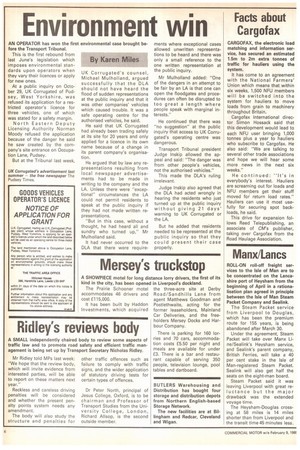Environment win
Page 8

If you've noticed an error in this article please click here to report it so we can fix it.
case brought be
By Karen Miles
This is the first rebound from last June's legislation which imposes environmental standards upon operators when they vary their licences or apply for new ones.
At a public inquiry on October 29, UK Corrugated of Pudsey, West Yorkshire, was refused its application for a restricted operator's licence for three vehicles, one of which was stated for a safety margin.
North Eastern Deputy Licensing Authority Norman Moody refused the application because of the danger he said he saw created by the company's site entrance on Occupation Lane, Pudsey.
But at the Tribunal last week, UK Corrugated's counsel, Michael Mulholland, argued successfully that the DLA should not have heard the flood of sudden representations at the public inquiry and that it was other companies' vehicles which caused trouble. It was a safe operating centre for the authorised vehicles, he said.
He said that UK Corrugated had already been trading safely at its site for 20 years and only applied for a licence in its own name because of a change in its parent company's organisation.
He argued that by law any representations resulting from local newspaper advertisements had to be made in writing to the company and the LA. Unless there were "exceptional" circumstances the LA could not permit residents to speak at the public inquiry if they had not made written representations.
"But in this case, without a thought, he had heard all and sundry who turned up," Mr Mulholland said.
It had never occurred to the DLA that there were require ments where exceptional cases allowed unwritten representations to be heard and there was only a small reference to the one written representation at the public inquiry.
Mr Mulholland added: "One of the dangers in an attempt to be fair by an LA is that one can open the floodgates and procedures can often be disrupted to too great a length where people speak with marginal interests."
He continued that there was "no suggestion" at the public inquiry that access to UK Corrugated's operating centre was dangerous.
Transport Tribunal president Judge lnskip allowed the appeal and said: "The danger was from other people's vehicles, not the authorised vehicles."
This made the DLA's ruling irrelevant.
Judge lnskip also agreed that the DLA had acted wrongly in hearing the residents who just turned up at the public inquiry without giving 21 days' warning to UK Corrugated or the LA.
But he added that residents needed to be represented at the public inquiry so that they could present their case properly.


































































































